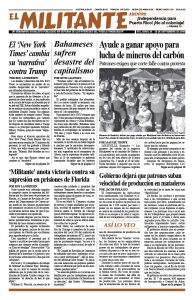September 26, 1994
Working people the world over have a responsibility to demand Washington halt all plans for a military invasion of Haiti. Clinton’s order to put 20,000 U.S. troops into battle to supposedly defend democracy is sheer hypocrisy. Far from any humanitarian concern for the people of that country, the White House wants to assert Washington’s prerogative to police the Caribbean, and all of Latin America, increase U.S. economic and military domination, and keep it safe for big-business interests.
The treatment of thousands of Haitian refugees fleeing the military thugs in Port-au-Prince — returning many of them to the hands of the Haitian military, or locking them up at the Krome detention camp in Florida and the Guantánamo prison camp at the U.S. naval base in Cuba — is the real testament to Washington’s regard for the human rights of the Haitian people.
September 26, 1969
After eight years of exile in Cuba, China and Tanzania, Robert F. Williams is home. The Black revolutionary, originally from Monroe, North Carolina, arrived in Detroit on a special Trans World Airlines fight in which he and his lawyer were the only passengers.
Williams’ return from exile received wide publicity when TWA and other air companies refused to honor his ticket as he sought to change planes for the U.S. in London. For seven days, Williams was barred by the airlines from returning to the U.S. and held in custody in a British prison. As protests began to mount, the U.S. government finally made a formal request that a special flight for Williams be arranged.
Williams was forced to flee the country after Monroe, N.C. authorities sought to frame him up on a kidnapping charge growing out of his role in a local protest movement.
September 23, 1944
GRAND RAPIDS, Mich. — The more than 2,300 delegates to the CIO United Automobile, Aircraft and Agricultural Implement Workers Ninth Annual Convention adjourned the stormiest national gathering of the union’s history.
They are returning to their locals with the key convention issue, the no-strike pledge, placed for final decision in the hands of the entire membership through a referendum to be held within the next 90 days. This was voted overwhelmingly by the militant rank and file delegates in opposition to most of the top leadership, after a precedent-shattering four-day bitter conflict.
Most decisive was the rise of a new, militant force led by the recently established Rank and File Caucus, which in its first struggle rolled up a vote of 36 percent for outright scrapping of the no-strike pledge.

